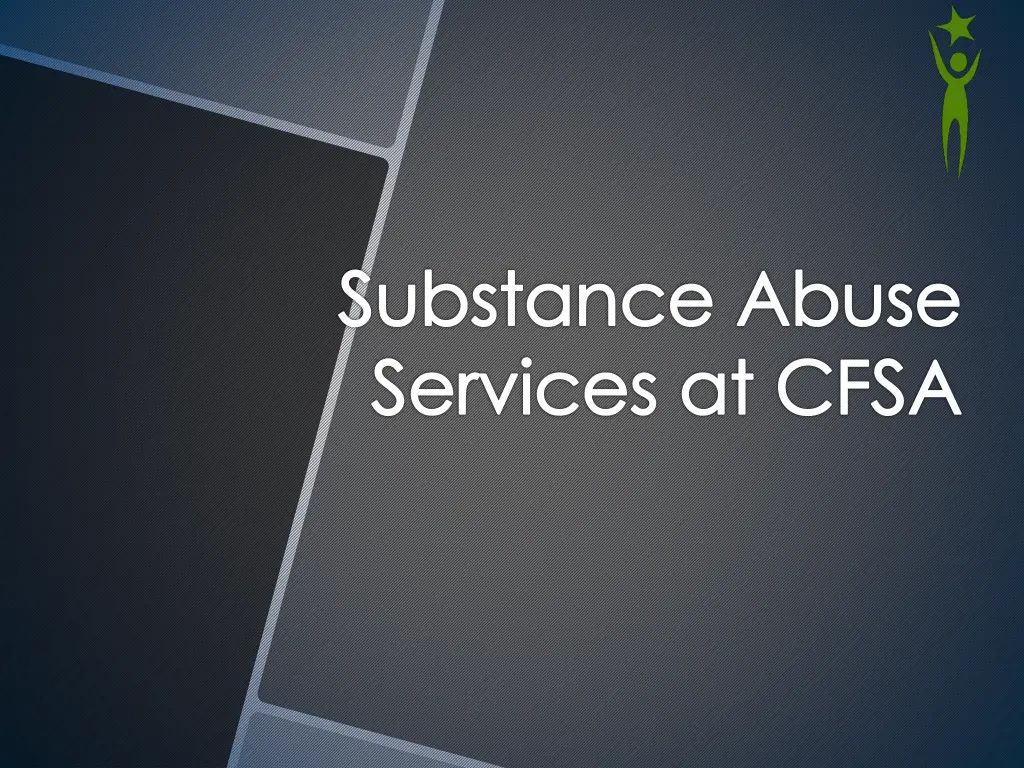
Substance Abuse Services at CFSA - Importance and Overview
Learn about the Substance Abuse Services offered at CFSA, including the importance of these services, ways to build nurturing environments, and strategies for positive coping. Discover the various consultations, trainings, and linkages available for adults and youth. Gain insights from data analysis, substance reports, referral administrations, and updates on Family Treatment Court's well-being education program.
Download Presentation

Please find below an Image/Link to download the presentation.
The content on the website is provided AS IS for your information and personal use only. It may not be sold, licensed, or shared on other websites without obtaining consent from the author. If you encounter any issues during the download, it is possible that the publisher has removed the file from their server.
You are allowed to download the files provided on this website for personal or commercial use, subject to the condition that they are used lawfully. All files are the property of their respective owners.
The content on the website is provided AS IS for your information and personal use only. It may not be sold, licensed, or shared on other websites without obtaining consent from the author.
E N D
Presentation Transcript
Substance Abuse Services at CFSA
Importance of Substance Use Services Why it matters: Build more nurturing and safer environments Facilitate reunification Promote positive developmental experiences Encourage more positive coping strategies for traumatic life experiences What we can do about it: Early Screening Assessment Treatment Better Outcomes!
Substance Abuse Service Overview Consultations and Trainings Adult Linkage to Assessments and Resources DBH Co-located Staff for SA Assessments (to be filled) Family Treatment Court and the linkage of Recovery Specialists Ability to Capture Some Drug Screening Results Youth Linkage Directly to DBH for Collaboration with ASTEP and TAY Providers
Adult drop-off analysis Helped to identify gaps and needed services Used information to inform strategies going forward
Substances Reported on Referral Marijuana 7% Alcohol Rx Pills 23% 56% Cocaine Heroin K2/Synthetic 0% 4% Meth 15% 1% PCP 8% 20% Not Undicated
Administrations Submitting Referrals in FY17 Administrations Submitting Referrals in FY17 350 300 250 200 325 150 100 122 50 91 48 7 0 CPS Private Agency Permanency OYE In Home
Well Being Education Updates Family Treatment Court An alternative to traditional justice system case processing. Courts keep individuals in treatment long enough for it work while providing wrap-around support and close monitoring. Participants are accountable to the Judge, submit to regular and random urinalysis and are rewarded or sanctioned based on behavior. The appeal for parents is FTC parents typically reunify faster with their children. FTC Redesign 2015 and upcoming in 2018 Tiered court model- 4 phases (to be changed to 5 in FY18) Addition of Recovery Specialists (reduction to 2 in FY18) Now fathers are included SA options expanded (all levels of care offered) Stipulation requirement being eliminated (to be changed to acknowledgement or stipulation in FY18) Reunification based on progress and compliance
Number Served Average program length Average length of time for reunification Percentage of positive screens Jan1-Dec 31 while in program 49 parents 95 days* 319 days (without outliers 6 months) 13% of 1,209 tests Jan1-June 31 27 parents 237 days 132 days (7-8 months for reunification) 18% of 702 test
Support Services Recovery Specialist Recovery Specialist help to navigate the system and help steer caregivers to an appropriate and accessible treatment option that will meet their individual needs. Some task are: Outreach to potential clients; engage to enter FTC Collaborate with treatment providers to develop recovery plans and relapse prevention plan (to include child welfare and treatment goals) Collaborate with social workers on client progress and challenges Monitor and support clients through treatment progression Attend court hearings, staffing's, red team meetings, family team meetings and other meetings scheduled around case planning Complete court reports and attend FTC weekly
Moving Forward What we learned Clients are more likely to attend assessments at CFSA then at APRA-ARC or Urgent Care. The CARA Act has significantly increased substance abuse referrals in FY18 thus far. Clients are more successful when linked to a Recovery Specialist services but their caseloads are limited. Challenges we face Engaging adult and youth clients to complete assessments and treatment (if recommended). Increasing the utilization of Family Treatment Court (program capacity is 30, we averaged around 20 participants per month in Fy17). Triaging referrals for substance affected families by risk need.
Contact Information Sarah Koreishi Deputy Director for Well Being 442-6174 Nicole Gilbert Administrator for Well Being 442-6963 Valerie Kanya Substance Abuse Program Specialist 727-4283
